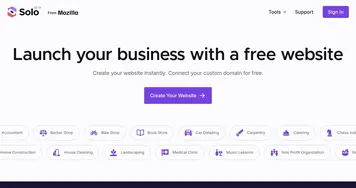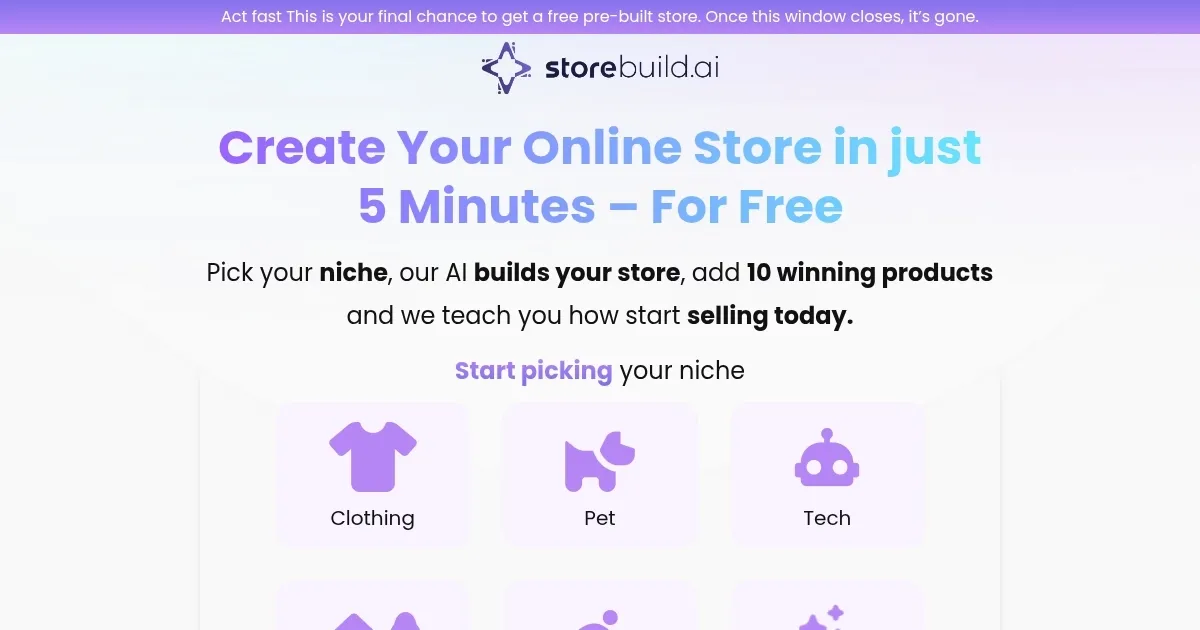Storebuild.ai

Last weekend, I gave Storebuild.ai a spin, and my first impression is that it’s like watching a magic trick unfold. You click a few buttons, pick a niche — clothing, in my case — and poof! A Shopify store appears, complete with products and a polished look. It took me about 10 minutes, not five, but who’s counting when the result is a store that looks ready to sell? The AI builder is the star here, churning out a homepage, product collections, and even legal pages like returns and shipping policies. For someone like me, who’s more comfortable browsing than building, it felt like a cheat code for e-commerce.
The best part? The 10 preloaded products. Mine included trendy sneakers and graphic tees, sourced via Zendrop, which handles the dropshipping hassle. The custom theme, which they claim is worth $200, gave my store a clean, professional vibe. I also liked the automation features — product sourcing and order fulfillment run on autopilot, so I could focus on dreaming up marketing ideas. Compared to BigCommerce or Squarespace, Storebuild.ai feels laser-focused on speed and simplicity, perfect for newbies like me who want to test the waters.
But, I hit a few snags. The AI-generated design, while sharp, felt a bit generic, like a template you’ve seen before. I wanted to tweak the colors to match my vibe, but the customization options were limited without diving into Shopify’s editor. Also, the “winning” products were solid but not exactly tailored to my niche’s quirks — think broad appeal over hyper-specific. And while the store is free, the Shopify subscription (required to go live) adds a cost I hadn’t fully considered.
The community access was a pleasant surprise. I peeked into their 20,000-strong seller group, and it’s buzzing with tips and success stories. It’s motivating, especially when you’re just starting. I wasn’t expecting the included sales course either — it’s basic but covers the essentials, like setting up ads.
My advice? Give Storebuild.ai a try if you’re new to e-commerce and want a quick start. Pick a niche you know, play with the store for a day, and don’t be afraid to swap out products if they don’t feel right. It’s a low-risk way to test your entrepreneurial chops.
What are the key features? ⭐
- AI Store Builder: Creates a Shopify store in minutes with no coding required.
- Preloaded Products: Includes 10 dropshipping products curated via Zendrop.
- Custom Themes: Offers a $200-value theme to boost store conversions.
- Automation Tools: Streamlines product sourcing and order fulfillment.
- Sales Course: Provides training to help users start selling quickly.
Who is it for? 🤔
Examples of what you can use it for 💭
- New Entrepreneur: Launches a clothing store with AI-selected products to test market demand.
- Content Creator: Builds a pet product store to monetize a niche audience.
- Small Business Owner: Creates a tech gadget shop with automated fulfillment.
- Hobbyist Seller: Sets up a sports equipment store to sell curated gear.
- Side Hustler: Starts a home goods store with preloaded products to earn extra income.
Pros & Cons ⚖️
- Fast store setup in minutes.
- Preloaded products save time.
- Automation simplifies logistics.
- Designs can feel generic.
- Limited customization options.
FAQs 💬
Related tools ↙️
-
 Windframe
Builds Tailwind CSS websites using a no-code drag-and-drop interface
Windframe
Builds Tailwind CSS websites using a no-code drag-and-drop interface
-
 Webstudio AI
Combining AI with a visual website builder to allow users to create websites more efficiently
Webstudio AI
Combining AI with a visual website builder to allow users to create websites more efficiently
-
 Durable
AI tool to build websites, including curated images and AI-written content
Durable
AI tool to build websites, including curated images and AI-written content
-
 Limecube
Generates custom AI-powered websites in minutes for startups
Limecube
Generates custom AI-powered websites in minutes for startups
-
 Dorik AI
An AI-powered, no-code website builder for creating professional and responsive websites
Dorik AI
An AI-powered, no-code website builder for creating professional and responsive websites
-
 Solo
Creates professional websites instantly using AI-driven design
Solo
Creates professional websites instantly using AI-driven design


